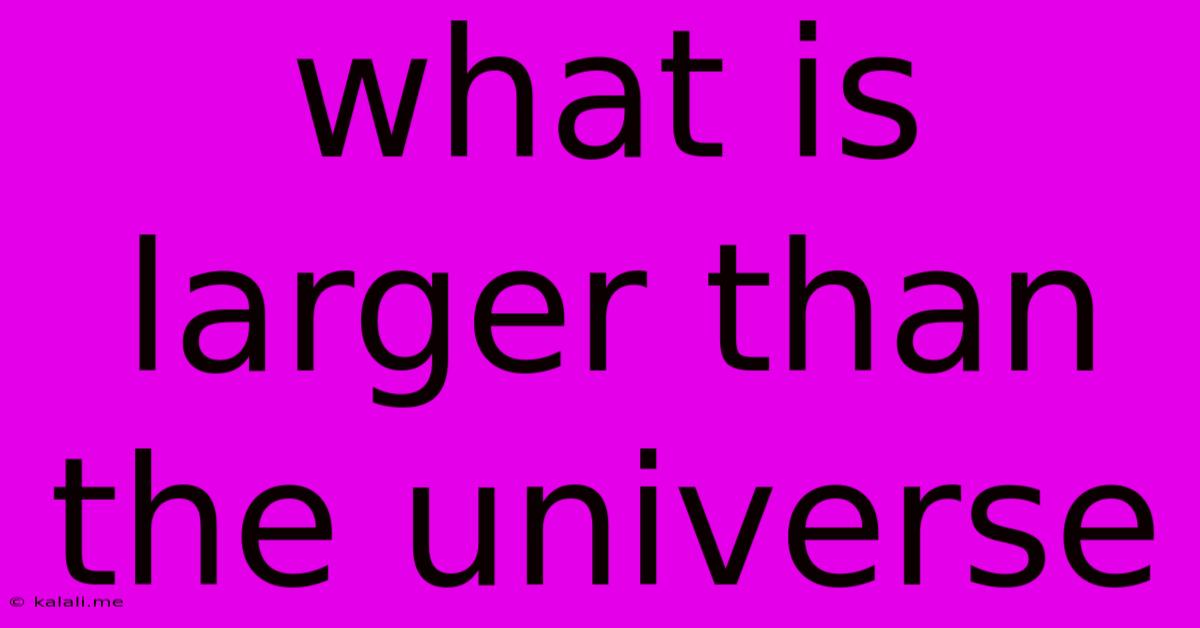What Is Larger Than The Universe
Kalali
May 21, 2025 · 3 min read

Table of Contents
What is Larger Than the Universe? A Dive into Cosmic Scales and Beyond
The universe, with its billions of galaxies, each containing billions of stars, feels unimaginably vast. But what if I told you that the concept of something "larger than the universe" is a surprisingly complex and fascinating question, one that touches on the very nature of space, time, and existence itself? This article explores the different perspectives on this seemingly impossible concept, delving into multiverse theories and the limits of our current understanding.
This article will delve into the complexities of the question, exploring the limitations of our current understanding of the universe's size and structure, and examining the theoretical concepts that propose something beyond it. We'll explore different interpretations of "universe" and consider whether anything could genuinely be considered "larger."
The Observable Universe vs. the Entire Universe
First, we need to clarify a crucial distinction: the observable universe and the entire universe. The observable universe is the portion of the cosmos we can currently see, limited by the distance light has traveled since the Big Bang. It's a sphere with a radius of about 46.5 billion light-years. Beyond this sphere, light hasn't had enough time to reach us yet. However, this doesn't mean that's the universe's extent. The entire universe could be infinitely larger, potentially stretching far beyond what our telescopes can detect. We simply lack the observational tools and understanding to determine its true size.
The Multiverse Hypothesis: Beyond Our Universe
The most common answer to the question of "what's larger than the universe?" leads us to the fascinating concept of a multiverse. This isn't a scientifically proven theory, but a collection of hypotheses exploring the possibility of multiple universes existing alongside our own. These universes could be vastly different, with varying physical laws, constants, and even dimensions. Some multiverse theories propose an infinite number of universes, each with its own unique properties. In this context, the multiverse itself could be considered larger than any single universe within it.
Types of Multiverse Theories: A Brief Overview
Several multiverse models exist, each with its own characteristics:
- The Many-Worlds Interpretation of Quantum Mechanics: This suggests that every quantum measurement causes the universe to split into multiple branches, each representing a different possible outcome.
- Inflationary Multiverse: This theory proposes that the universe underwent a period of exponential expansion after the Big Bang, potentially creating numerous "bubble universes," each with its own set of physical laws.
- String Theory Landscape: String theory suggests the existence of a vast "landscape" of possible universes, each with different configurations of extra spatial dimensions.
Beyond Size: The Problem of Defining "Larger"
Defining "larger" becomes problematic when dealing with concepts like the multiverse. If universes are fundamentally separate entities, comparing their sizes might be meaningless. The concept of "size" as we understand it relies on a shared spatial framework, something that might not exist across different universes in a multiverse. We might need to reconsider what "larger" truly means in this context.
Conclusion: The Unanswerable, Yet Fascinating Question
The question of what is larger than the universe remains, for now, unanswerable. Our current understanding of cosmology and physics restricts our ability to definitively determine the universe's true size and whether anything exists beyond it. However, exploring these possibilities pushes the boundaries of our scientific knowledge and sparks our imaginations, driving us to explore the profound mysteries of the cosmos and the very nature of reality itself. The multiverse hypothesis, while speculative, provides a framework for thinking about this seemingly impossible question, fueling ongoing scientific debate and inspiring awe at the sheer scale of the cosmos and its potential.
Latest Posts
Latest Posts
-
Adobe Illustator Cant Use Paint Brush
May 23, 2025
-
Can You Point Us To The Right Person
May 23, 2025
-
Dbus Failed Connection 1 61 Is Not Allowed
May 23, 2025
-
Format Usb To Ext3 Mac Os
May 23, 2025
-
How To Express Trace In Equation Latex
May 23, 2025
Related Post
Thank you for visiting our website which covers about What Is Larger Than The Universe . We hope the information provided has been useful to you. Feel free to contact us if you have any questions or need further assistance. See you next time and don't miss to bookmark.